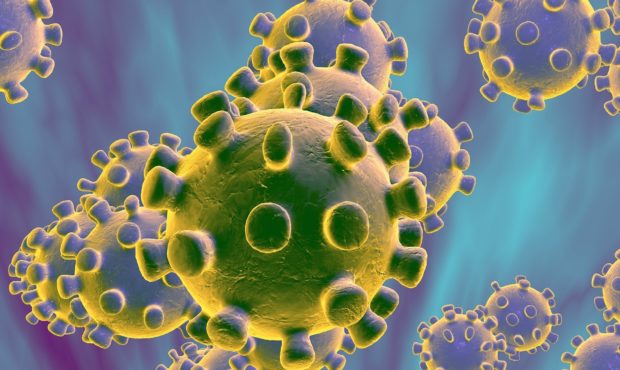Coronavirus explained: What you need to know
Jan 20, 2020, 6:30 PM | Updated: Mar 12, 2020, 9:23 am

The Omicron variant was spotted by chief scientist at the Utah Public Health Laboratory. (Image credit: Shutterstock)
(Image credit: Shutterstock)
(CNN) — A new Chinese coronavirus, a cousin of the SARS virus, has infected more than 200 people since the outbreak began in Wuhan, China, in December. Scientist Leo Poon, who first decoded the virus, thinks it likely started in an animal and spread to humans.
“What we know is it causes pneumonia and then doesn’t respond to antibiotic treatment, which is not surprising, but then in terms of mortality, SARS kills 10% of the individuals,” Poon, a virologist at the School of Public Health at The University of Hong Kong, said.
The World Health Organization offered guidance to countries on how they can prepare for it, including how to monitor for the sick and how to treat patients.
Here are seven things you should know about a coronavirus.
What is a coronavirus
Coronaviruses are a large group of viruses that are common among animals. In rare cases, they are what scientists call zoonotic, meaning they can be transmitted from animals to humans, according to the US Centers for Disease Control and Prevention.
Coronavirus symptoms
The viruses can make people sick, usually with a mild to moderate upper respiratory tract illness, similar to a common cold. Coronavirus symptoms include a runny nose, cough, sore throat, possibly a headache and maybe a fever, which can last for a couple of days.
For those with a weakened immune system, the elderly and the very young, there’s a chance the virus could cause a lower, and much more serious, respiratory tract illness like a pneumonia or bronchitis.
There are a handful of human coronaviruses that are known to be deadly.
Middle East Respiratory Syndrome, also known as the MERS virus, was first reported in the Middle East in 2012 and also causes respiratory problems, but those symptoms are much more severe. Three to four out of every 10 patients infected with MERS died, according to the CDC.
Severe Acute Respiratory Syndrome, also known as SARS, is the other coronavirus that can cause more severe symptoms. First identified in the Guangdong province in southern China, according to the WHO, it causes respiratory problems but can also cause diarrhea, fatigue, shortness of breath, respiratory distress and kidney failure. Depending on the patient’s age, the death rate with SARS ranged from 0-50% of the cases, with older people being the most vulnerable.
How it spreads
Viruses can spread from human contact with animals. Scientists think MERS started in camels, according to the WHO. With SARS, scientists suspected civet cats were to blame.
When it comes to human-to-human transmission of the viruses, often it happens when someone comes into contact with the infected person’s secretions.
Depending on how virulent the virus is, a cough, sneeze or handshake could cause exposure. The virus can also be transmitted by touching something an infected person has touched and then touching your mouth, nose or eyes. Caregivers can sometimes be exposed by handling a patient’s waste, according to the CDC.
Coronavirus treatment
There is no specific treatment. Most of the time, symptoms will go away on their own.
Doctors can relieve symptoms by prescribing a pain or fever medication. The CDC says a room humidifier or a hot shower can help with a sore throat or cough.
Drink plenty of fluids, get rest and sleep as much as possible.
If symptoms feel worse than a standard cold, see your doctor.
How can you can prevent it
There is no vaccine to protect against this family of viruses, at least not yet. Trials for a MERS vaccine are underway.
You may be able to reduce your risk of infection by avoiding people who are sick. Try to avoid touching your eyes, nose and mouth. Wash your hands often with soap and water and for at least 20 seconds.
If you are sick, stay home and avoid crowds and contact with others.
Cover your mouth and nose when you cough or sneeze, and disinfect the objects and surfaces you touch.
Coronavirus and pregnancy
In pregnant women, the more severe versions of MERS and SARS coronaviruses can be serious. There are cases in which a woman infected with MERS had a stillbirth, a 2014 study showed.
SARS-associated illnesses were linked to cases of spontaneous abortion, maternal death and critical maternal illness, a 2004 study found.
Coronavirus and cats, dogs and other animals
Pets can catch coronaviruses and the infections can become severe. Sometimes the viruses can lead to deadly diseases. One can cause feline infectious peritonitis in cats and something called a pantropic canine coronavirus can infect cats and dogs, according to a 2011 study.
Cats can catch SARS, but none of the infected cats developed symptoms, according to the study. The feline coronavirus typically is asymptomatic, but can cause mild diarrhea. Feline infectious peritonitis, or FIP, can cause flu-like symptoms for a cat, but can also be more serious for cats and can cause organ failure, but it is not contagious and will not spread from animal to animal or person to person.
Pantropic canine coronavirus that can impact cats and dogs can be fatal to dogs, studies show.
These particular dog and cat viruses don’t seem to spread to humans.
The-CNN-Wire
™ & © 2020 Cable News Network, Inc., a WarnerMedia Company. All rights reserved.













